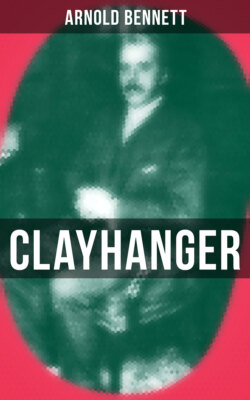Читать книгу CLAYHANGER - Arnold Bennett - Страница 84
На сайте Литреса книга снята с продажи.
Three.
ОглавлениеEdwin had chosen the subject of Bishop Colenso—the ultimate wording of the resolution was not his—because he had been reading about the intellectually adventurous Bishop in the “Manchester Examiner.” And, although eleven years had passed since the publication of the first part of “The Pentateuch and the Book of Joshua Critically Examined,” the Colenso question was only just filtering down to the thinking classes of the Five Towns; it was an actuality in the Five Towns, if in abeyance in London. Even Hugh Miller’s “The Old Red Sandstone, or New Walks in an Old Field,” then over thirty years old, was still being looked upon as dangerously original in the Five Towns in 1873. However, the effect of its disturbing geological evidence that the earth could scarcely have been begun and finished in a little under a week, was happily nullified by the suicide of its author; that pistol-shot had been a striking proof of the literal inspiration of the Bible.
Bishop Colenso had, in Edwin, an ingenuous admirer. Edwin stammeringly and hesitatingly gave a preliminary sketch of his life; how he had been censured by Convocation and deposed from his See by his Metropolitan; how the Privy Council had decided that the deposition was null and void; how the ecclesiastical authorities had then circumvented the Privy Council by refusing to pay his salary to the Bishop (which Edwin considered mean); how the Bishop had circumvented the ecclesiastical authorities by appealing to the Master of the Rolls, who ordered the ecclesiastical authorities to pay him his arrears of income with interest thereon, unless they were ready to bring him to trial for heresy; how the said authorities would not bring him to trial for heresy (which Edwin considered to be miserable cowardice on their part); how the Bishop had then been publicly excommunicated, without authority; and how his friends, among whom were some very respectable and powerful people, had made him a present of over three thousand pounds. After this graphic historical survey, Edwin proceeded to the Pentateuchal puzzles, and, without pronouncing an opinion thereon, argued that any commentator who was both learned and sincere must be a force for good, as the Bible had nothing to fear from honest inquiry, etcetera, etcetera. Five-sixths of his speech was coloured by phrases and modes of thought which he had picked up in the Wesleyan community, and the other sixth belonged to himself. The speech was moderately bad, but not inferior to many other speeches. It was received in absolute silence. This rather surprised Edwin, because the tone in which the leading members of the Society usually spoke to him indicated that (for reasons which he knew not) they regarded him as a very superior intellect indeed; and Edwin was not entirely ashamed of the quality of his speech; in fact, he had feared worse from himself, especially as, since his walk with Mr Orgreave, he had been quite unable to concentrate his thoughts on Bishop Colenso at all, and had been exceedingly unhappy and apprehensive concerning an affair that bore no kind of relation to the Pentateuch.
